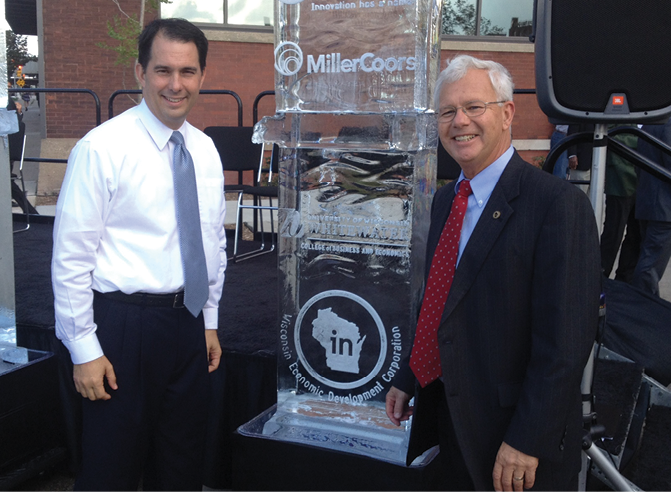


![]()
ONLINE

Reforming Wisconsin
Editors’ Note
In 1986, Scott Walker moved to Milwaukee to attend Marquette University. While in school, he worked for IBM before leaving school in his senior year to work full-time in development for the American Red Cross. He was elected to the State Assembly in 1993 and chaired several committees and authored several important pieces of legislation. In 2002, Walker was elected Milwaukee County Executive to reform the scandal-ridden county government. He cut the county’s debt by 30 percent, reduced its workforce by more than 25 percent, and authored nine consecutive budgets without increasing the property tax levy from the previous year. Despite failing national and state economies, Milwaukee County recorded a budget surplus. On January 3, 2011, Scott Walker was inaugurated as Wisconsin’s 45th Governor. He has proposed bold reforms that have eliminated the state’s $3.6- billion budget deficit without raising taxes, and has given school districts and local governments the tools to balance their budgets without the massive layoffs seen in other states. To date, these profound changes have saved Wisconsin taxpayers more than $1 billion, which led to a drop in property taxes on a median valued home for the first time in 12 years. Governor Walker remains committed to helping Wisconsin’s private sector create 250,000 jobs by 2015. On June 5, 2012, Walker became the first governor in American history to win a recall election. He won the election with more votes and by a higher percentage than he had won in 2010.
How economically strong is the State of Wisconsin today?
Overall, by a number of indicators, it’s strong and getting stronger every day.
Our unemployment is down for the right reasons. We have a larger workforce – higher employment as well as lower unemployment – so it’s not an issue like it might be at the federal level with people giving up on the job search. We see in the recent numbers over 6,200 seasonally adjusted non-formulated jobs – those numbers are up.
In terms of private sector job growth, from April through December of 2013, we have had the best private sector job growth since 1994. So the economy is improving.
The other nice indicator is that personal income is up – we have seen year-to-year, a 4.4 percent increase in personal income, and the jump from second to third quarter last year was the fourth highest of any state in the country.

Governor Walker and Wisconsin Economic
Development Corporation CEO Reed Hall at the
opening of the Global Water Center
in Milwaukee, Wisconsin
What success have you seen from your statewide initiative to help people find jobs?
For us to continue recovery as a state, and for us to recover as a country, workforce development will be a key element.
What we have consistently seen in our state is that most weeks, we have close to 50,000 jobs posted on a voluntary Web site called jobcenterofwisconsin.com.
Out of the nearly 50,000 jobs posted, many are in manufacturing and other related industries where there is a disconnect between the skills of those searching for jobs and the skills required by those looking to employ those individuals.
I put $100 million into my recent budget for worker training. It ranges from short-term multi-week courses where we do customized training, to more investment in our technical colleges or high-need areas, to a flex option with the University of Wisconsin to reduce the time and money it takes people to get a four-year degree in areas like engineering and health care. It also promotes more money in our graduate schools for primary care physicians in two of our medical schools that target underserved areas.
Also, even before post-secondary education, we put money in our schools as early as sixth grade to develop academic and career plans so kids can start to think about their career options well before they reach high school, and also to put incentives in high schools for more technical education.
We have a shortage in many technical fields, and many employers state that not only is there a gap in filling these positions, but they are often stopped from taking on more work as a result of not having the qualified workforce.

Governor Walker at the 110th Anniversary
of Shanghai Harley
Why can’t we effectively reform K–12 education and is the proper dialogue happening on that front?
Over the past three years, we have taken more giant steps forward in the education system than Wisconsin has over the past 30 years.
We passed Act 10, which reforms collective bargaining in the state of Wisconsin. This applies to not just state employees, but also local governments, including school districts.
From a reform standpoint, schools are no longer forced to accept union contracts for anything but base wages – everything else is gone. Schools can now hire and fire based on merit – not seniority and tenure – and they can base pay on performance so we put the best and brightest in the classrooms.
This helps school districts balance their budgets because they’re able to get more from pension and health-care contributions, although arguably much less than most of the private sector.
Now, principals can talk directly to teachers and other staff without a union steward, and they can get things done. It’s much more positive in terms of reform.
There is still plenty of work to be done, but it has had a tremendous impact, and we’ve seen that reforms have more than made up for the budget adjustments in schools over the past few years. They have been able to compensate for that in benefits and reform.
Our ACT scores also continue to be some of the best in the country, and graduation rates are up.
Will the reforms help to attract and retain good young teachers?
I can’t tell you how many young teachers come up to me and say that they are thrilled with what I’ve done, and that doesn’t fit the narrative in the state – they think all teachers must dislike me because of the reforms.
Many positions were opened for a lot of new and young teachers because some of the more senior teachers decided to leave. These new teachers are excited to be judged based on their merit.

Governor Walker at the Tianjin Harley
grand opening
How has Wisconsin been able to enact so many tax cuts?
The overwhelming reason for us having over $911 million in new revenue is a stronger economy based on more people working and more employers hiring; also, personal income is up.
The other part that goes in hand with that is also good fiscal management. We have reined in and managed costs in our state, which has been highly effective. Our pension systems are the only ones in the country that are fully funded; our per capita and debt ratio is one of the lowest in the country.
We have cut taxes over the past three years – $1.5 billion already; we reined in out-of-control regulations so what we enforce is about common sense, not just about bureaucratic red tape. We pulled back on frivolous lawsuits and we streamlined and reformed unemployment insurance in the state.
This has allowed us to help create an environment for economic growth. We don’t create jobs but we create a better environment for employers to create jobs and hire people.
Out of our surplus, about $100 million should go into the rainy day fund and the rest of it, about $800 million, will go into property and income tax cuts, and into withholding changes so more of that money goes into the hands of the taxpayers.
How critical is it to continue to make infrastructure investments?
It’s beneficial to those who are maintaining transportation infrastructure. But beyond that, it’s important because so many key industries in our state, particularly when it comes to dairy and farming, logging, mining, and even retail, are all heavily dependent on a good infrastructure system. It’s a multi-modal transportation system with good roads and bridges, freight rail, and ports and airports.
This year’s budget has a $6.4-billion investment – about $800 million is new. In order to keep that up, we want to keep a strong infrastructure system in place.
Is there an effective understanding of the Wisconsin brand today?
No. Except for Chicago, which is a global city, this has been a challenge for us in the Midwest. For example, although Wisconsin is the number-one exporter of Ginseng to China, that’s something not a lot of people know. We are known for medical devices because of GE Healthcare. People do recognize the strong Midwestern work ethic.
One positive that has resulted from the challenges we went through over the past few years has been that a lot of employers across the country have seen that we’ve been willing to make big reforms to change our fiscal situation.
Will the close scrutiny of those in public service make it more difficult to attract young talent?
In the past, sometimes we felt the way to attract top talent was to tell them they’d have a job for life. But young people today are different – they want to feel they’re impactful.
In the future, you’re likely to see people come in and out of public service. So it makes sense to have employment opportunities that are more flexible, more focused on meeting objectives and the goal of the job, and less about rigid parameters.
Do you ever stop to appreciate all that you’ve already achieved?
I enjoy it the most when I go to businesses in my state and I can see the progress being made. When you savor it all, you see more reason to work harder to do more.
When you see the impact you’ve had in various areas and all the attention that you have received in your current role, how do you react to that?
Not only am I flattered but I feel good about it. The reason people are bringing this up is not because I have given a spectacular speech or done something well received – it’s because of what we have done together. We created big reforms in Wisconsin. If we hadn’t pushed for reforms, and if those reforms hadn’t worked and weren’t in the process of working, no one would be singing our praises.
From the standpoint of being proud of our state and our reforms, I’m flattered less on a personal level and more on a state level, because it means we’re doing good things and it’s all the more encouraging to keep doing them.•